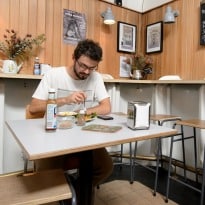With spiralling land prices turning even the darkest corners of London into potential goldmines, the city's forgotten spaces, including 19th-century public toilets, are blossoming into restaurants, cafes and boutiques. Many Victorian urinals remained abandoned for decades after World War II, but encouraged by local officials keen for fresh sources of income, the conversion wave is gathering pace.Many embrace their lavatorial heritage, like "The Convenience" - a coffee shop that opened in the trendy district of Hackney in 2013, "WC" - a wine bar in Clapham in south London and "ArtsLav" - a performing arts space in Kennington. Others have chosen less literal names like "The Attendant" and the "Cellar Door" cabaret, both in the city centre.The trend has "picked up recently", according to Rachel Erickson, whose job organising guided tours of the city's working public toilets has earned her the nickname "Lady Loo".
Jayke Mangion, 34, who opened "WC" in July, explained that "the government has been pushing the councils to use all empty places to generate revenues". Whether it be derelict toilets or abandoned underground stations, many more unusual sites are coming on the market, offering far more affordable rents than traditional addresses.- Days of Scrubbing -Housed in a Victorian subterranean toilet block attached to Clapham Common underground station, "WC" has kept its original mosaic floor and tiled walls and the woodwork has been fashioned into tables and intimate alcoves. The old urinals are no longer in use but have stayed on as decor in the new bathrooms.Katie Harris, owner of "The Convenience" - a restaurant by day and bar by night - has instead made the porcelain pots a feature, supporting the wooden bar. The 30-year-old explained that she did not want "deny it was a toilet" but also was wary of making the space "too toilety".
Yellowed urinals were taken out as they were considered "too peey" for customers, while the others were scrubbed for days to reveal a gleaming white porcelain.As well as the attractive rents, Harris, who is also a designer, said that she chose the space for the professional challenge it posed, and because of its simple 1940s architecture. "It is important to preserve these places, to make them places for the community," she said. Ryan De Oliveira, who runs "The Attendant" cafe, added: "To give a new life to something previously unused, it pushes the boundaries."The former financier also embraced his building's history, turning the 1890s toilet cisterns into flower pots and keeping the urinals in place. "The coffee is very good, there's a nice atmosphere and it's an original location," said one client, Laurent.At "WC", Philip, 35, suggested that the use of original fittings "adds to the charm of the place". "It gives it a cosy feel and it doesn't smell anymore, so it's all good. I like it," he said.Wine bar owner Mangion said that despite the expensive refurbishments, there is still plenty of down-to-earth toilet humour with customers.
Jayke Mangion, 34, who opened "WC" in July, explained that "the government has been pushing the councils to use all empty places to generate revenues". Whether it be derelict toilets or abandoned underground stations, many more unusual sites are coming on the market, offering far more affordable rents than traditional addresses.- Days of Scrubbing -Housed in a Victorian subterranean toilet block attached to Clapham Common underground station, "WC" has kept its original mosaic floor and tiled walls and the woodwork has been fashioned into tables and intimate alcoves. The old urinals are no longer in use but have stayed on as decor in the new bathrooms.Katie Harris, owner of "The Convenience" - a restaurant by day and bar by night - has instead made the porcelain pots a feature, supporting the wooden bar. The 30-year-old explained that she did not want "deny it was a toilet" but also was wary of making the space "too toilety".
A picture shows the interior of the "The Convenience", a former public toilet that has been converted into a coffee shop and restaurant in Hackney, east London.
Yellowed urinals were taken out as they were considered "too peey" for customers, while the others were scrubbed for days to reveal a gleaming white porcelain.As well as the attractive rents, Harris, who is also a designer, said that she chose the space for the professional challenge it posed, and because of its simple 1940s architecture. "It is important to preserve these places, to make them places for the community," she said. Ryan De Oliveira, who runs "The Attendant" cafe, added: "To give a new life to something previously unused, it pushes the boundaries."The former financier also embraced his building's history, turning the 1890s toilet cisterns into flower pots and keeping the urinals in place. "The coffee is very good, there's a nice atmosphere and it's an original location," said one client, Laurent.At "WC", Philip, 35, suggested that the use of original fittings "adds to the charm of the place". "It gives it a cosy feel and it doesn't smell anymore, so it's all good. I like it," he said.Wine bar owner Mangion said that despite the expensive refurbishments, there is still plenty of down-to-earth toilet humour with customers.
Advertisement
For the latest food news, health tips and recipes, like us on Facebook or follow us on Twitter and YouTube.
Tags:










